Tarquin The Proud, Last King of Rome
To quote the great Terry Pratchett, people always seem to have a “little blank spot in their heads where someone had written: Kings. What a good idea.” Even in modern times, when we fool ourselves into thinking we’ve moved on from this, you still see a horrible tendency for people to abandon their responsibility for their own lives to someone “better” than them. Despite all of history teaching us that putting a single fallible person in charge of an entire country (or empire) is almost always a bad idea, people still want to elevate someone onto a pedestal and then bow to it. Ridding yourself of the disease of monarchy can take generations, but sometimes all it takes is a single sharp shock. For the people of Rome, Tarquin the Proud was that shock.
Tarquin was the seventh king of Rome, or so the remaining histories tell us. At that time Rome was a far cry from the “eternal city” it would become, but it had also moved on past the colony of escaped slaves and brigands that the legendary Romulus had founded sometime in the 8th century BCE. Who Romulus actually was, and how much of that early history is true, is a rabbit hole that we will avoid today. He was followed by a succession of equally legendary kings, until we come to the fifth king of Rome, Tarquin’s father (or possibly grandfather) Lucius Tarquinius Priscus.
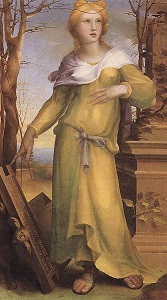
Priscus was not a Roman, but then even at that point most people living in Rome weren’t. It was a city of migrants and a land of opportunity, which was exactly what brought Priscus there. He was half Etruscan and half Greek, born in Etruria. He inherited a fortune but was blocked from public office because of his foreign heritage. His wife Tanaquil suggested to him that he move to Rome, which had no such laws at the time. So they did. As they entered the city an eagle stole Priscus’ hat, which Tanaquil insisted was a good omen.
The talents of Priscus (and his fortune) soon brought him a good reputation in Rome, and he became friends with the king Ancius Marcius. Marcius appointed him as the guardian of his sons, who he wanted to succeed him when he died. But when he did die unexpectedly the boys were still young, and also conveniently out of town. Priscus went to the Senate (at that time two hundred men representing the most established Roman families) and convinced them that he should take over. They presented him to the public, who acclaimed him as their ruler. This made him the fifth king of Rome.
Priscus waged war successfully both on the other Italian tribes and on his own Etruscan former countrymen, establishing Roman dominance. He also built some of the great structures that would become the heart of Rome, such as the Circus Maximus. More significantly for the long-term good of the city he also built the Cloaca Maxima, Rome’s innovative sewer system. This made Rome in the long term far healthier than those cities it opposed. He ruled from 616 BCE to 579 BCE, before dying of head injury sustained in a riot. Legend has it that the riot was sparked by the sons of Marcius who he had taken the throne from. His death was concealed for some time, while his widow Tanaquil maneuvered to put his son-in-law Servius Tullius on the throne. Only after “Regent” Tullius had won a military victory against the rebellious local Latin tribes and was being hailed a saviour did they reveal the truth and have him installed as king.
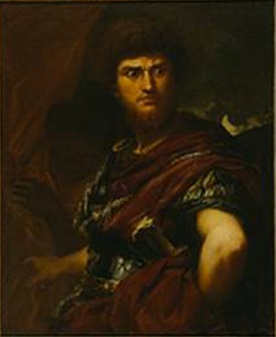
Lucius Tarquinius Superbus (Tarquin the Proud) is said by legend to have been Tarquin’s son, but the reasearch of some historians (and the general chronology of events) make it likely that he was Priscus’ grandson. Whatever the case was, he and his brother Arruns were the natural heirs of Priscus. Tullius had no sons, so he married his two daughters Tullia Major and Tullia Minor (their first names are lost to history) to Tarquin and Arruns. (This was either a marriage of cousins to cousins or of uncles to nieces, depending on the boys relationship to Priscus.) Tarquin much preferred his brother’s wife, Tullia Minor, to his own though. The pair had matching temperaments, fiercely ambitious and not inclined to let anything get in their way. This was aptly demonstrated when the pair arranged for their unfortunate brother and sister to be murdered, freeing them to marry each other.
Servius was remembered as the greatest of the Roman kings by later Romans, as he was the one credited with the reforms that gave the common people (the “plebs”) a voice in government. He was also the first to institute a census of the Roman people, which assigned someone’s tax obligations as well as tying them to a particular district for voting purposes. All of this made him popular with the people but it also made him unpopular with the Senate. The ambitious Tarquin saw this, and decided to take advantage.
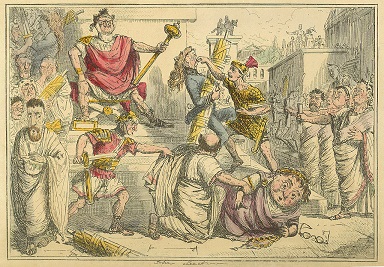
He and Tullia began a whispering campaign against the king. He was a tyrant who had not been properly acclaimed by the people. His census was just an excuse to find the richest men and steal their property. He was a slave who had been gifted the throne by his predecessor’s widow (and what had lain behind that, the gossips wondered). He had raised up the lower classes over the rich, disrupting the social order. When the mood was right Tarquin went to the Senate and gave a speech denouncing Tullius. When Tullius appeared to defend himself, Tarquin grabbed him and threw him down the steps of the Senate onto the street. His loyal men then stepped in and finished the old man off. Tarquin forbade anyone to remove the body from the street, so it was left lying there. Later, as Tullia was travelling to the palace, she came down that street in her chariot. She saw her father’s body, and ordered her charioteer to ride directly over it. When he refused, she grabbed the reins and drove the chariot over the body herself. The dead king’s blood flew up and stained her toga, symbolising her complicity in his death.
After declaring himself king in 534 BCE, Tarquin lost no time in instituting a purge of those who had opposed him in the Senate. He ordered death sentences carried out immediately without trial, and he did not replace the Senate mebers who were killed. In essence then he showed that he intended to rule as king absolute, without any deference to the Senate. Even his own relatives were not immune, as one of those killed was a grandson of Lucius Tarquinius Priscus. The dead man’s brother Lucius Junius managed to avoid being purged by feigning stupidity, which earned him the cognomen (nickname) of “Brutus”, which meant “slow-witted”. Cognomens were common through Roman times as people were often named after relatives. Tarquin, for example, was distinguished from the previous king Lucius Tarquinius by the cognomen of Superbus – “the Proud”. Brutus cemented his reputation by allowing Tarquin to “trick” him into giving up his inheritance from his brother.
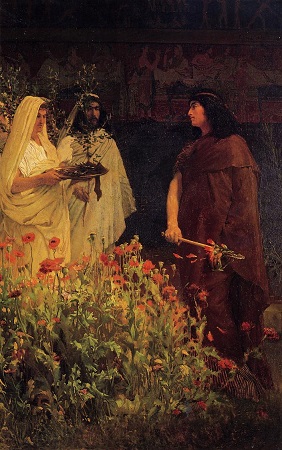
At this time this area of Italy was home to a variety of different tribes known as the Latins. Rome was the most powerful city in the region, but its domination over the Latins was far from secure. In order to solidify that hold Tarquin called a council of all the tribes. He deliberately left the council sitting waiting for him in order to see if any of them would speak up against him. A leader from the town of Aricia named Turnus Herdonius took the bait. He gave a speech about how Tarquin’s arrogance and untrustworthiness was shown by making them sit like this. Tarquin bribed a servant of Turnus to hide weapons in his master’s lodgings and then denounced Turnus before the council as planning to lead a rebellion against him. When the weapons were found the protesting Turnus was sentenced to death, a sentence carried out by putting him in a pool of water with a wicker frame over his head. Each man on the council placed a stone in the frame, and the combined weight drowned the innocent man.
With the council now bound to him in blood Tarquin persuaded them to combine their military with his, and he began a series of wars out across Italy to extend the dominion of Rome. One notable episode during these campaigns involved his youngest and most cunning son, Tarquinius Sextus. Sextus was the youngest of three sons, and there was no love lost between him and his brothers. When he turned up outside the city of Gabii covered in whip marks claiming that they had exiled him he was believed without question. Gabii was one of the cities that defied Tarquin, so it was a natural place for Sextus to flee to. Of course, it was all a plot he and his father had thought up. When Sextus was made a military leader in Gabii, he secretly met with his father to decide how he could deliver the city to him. Tarquin didn’t say anything, but picked up a stick and began beheading all the tallest poppies in the garden. Sextus understood his meaning and returned to Gabii, where he disposed of all the leading men through subterfuge and lies. When the city was leaderless he found it easy to persuade them to submit to Tarquin’s rule.
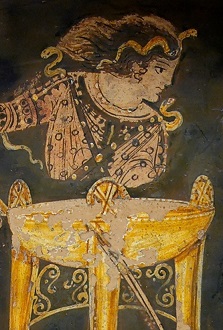
The two brothers of Sextus were named Titus and Arruns. During Tarquin’s reign, they were sent to see the Oracle at the Temple of Apollo in Delphi after Tarquin witnessed an omen. After they had received the interpretation, they asked who would succeed their father as ruler. “The first of you to kiss their mother”, they were told. The two men began to race each other home to be the first to kiss Tullia. However they had allowed their “slow witted” cousin Brutus to come with them, and he was the only one smart enough to know that when a divine oracle said “your mother”, she usually meant Mother Earth. So he pretended to trip, and secretly kissed the earth as he lay on the ground. He was mocked by the others for his clumsiness, but who expected anything else from a Brutus?
By 510 BCE Tarquin’s tyrannous ways had made him unpopular with the people. He decided that a profitable war would bring them back to his side, so he invaded a tribe southeast of Rome named the Rutuli. They were rich, and he was hoping to bring plenty of booty back to his capital. However the war was not the pushover he had hoped for, so he and his army were forced to lay siege to Ardea, the Rutuli capital. During the siege Tarquin’s son Sextus was sent on an errand to the town of Collatia. The governor of Collatia was a kinsman of his, Lucius Tarquinius Collatinus. (Collatinus was descended from Priscus’ brother Arruns, who had died before Priscus moved to Rome.) At the time Collatinus was in the army laying siege to Ardea, so Sextus was hosted by his wife Lucretia. She was the daughter of a Roman noble, famed for her beauty and her virtue, and Sextus was immediately stricken by her.
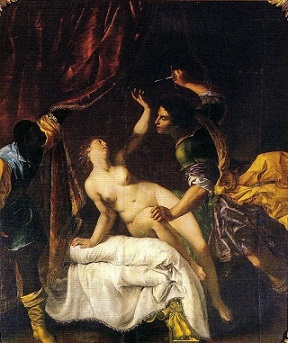
Another story has Sextus meeting Lucretia when Collatinus boasted of her virtue and then brought the Roman officers to see her weaving. However he became aware of her though, the result was the same. One night shortly afterwards he entered her room at night by stealth. He told her of his desire for her, and that he would marry her once he had disposed of her husband. When she made to cry out, he threatened that he would kill her and one of the male slaves, place their bodies together, and claim to have caught them in adultery and have been overcome by passion. That way she would not only die, but die in dishonour. With no other choice, Lucretia was forced to remain silent as he raped her.
After Sextus had returned to the military camp, Lucretia considered her choices. She dressed in mourning clothes, and either went to see her father in Rome or sent for him and her husband to come to Collatia. They were each to bring one friend to serve as witness, and the witness for Collatinus was Lucius Junius Brutus. She told the story of what had happened and what Sextus had done. She made them swear to exact vengeance, and then before they could stop her she stabbed herself in the heart and died.
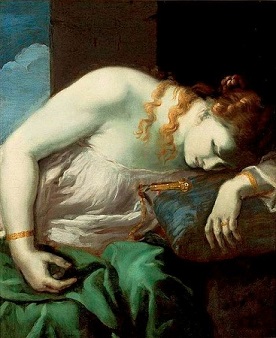
Whether it was in Rome or in Collatia, Lucius Junius Brutus was on the ground to organise a conspiracy to overthrow Tarquin and get revenge for Lucretia. He astounded the grieving Collatinus and Lucretia’s father Lucretius by revealing that his supposed stupidity had been a sham, and by declaring his intention to drive Tarquin and his heirs from power. He drew forth the dagger from Lucretia’s breast and, holding it, swore an oath to end the tyranny of the Tarquins and all tyranny in Rome. He passed the dagger around and each man present swore the same oath:
By this blood – most pure before the outrage wrought by the king’s son – I swear, and you, O gods, I call to witness that I will drive hence Lucius Tarquinius Superbus, together with his cursed wife and his whole blood, with fire and sword and every means in my power, and I will not suffer them or anyone else to reign in Rome.
They lifted Lucretia’s body and carried it to the Roman Forum, a market square at the centre of the city. There they told everyone what had happened, and encouraged others to speak their grievances against the king as well. Brutus had been given the position of Tribune Celerum (Commander of the King’s Bodyguard) as Tarquin had believed him too slow to pose a threat. This gave him the authority to summon the magistrates of the city, and when they arrived he reoarganised the proceedings as a trial of the king. Then he gave one of the most famous speeches in Roman history. He recounted the crimes of Tarquin and his family, from the murder of Servius Tullius to the rape of Lucretia. He spoke of the commoners who had been compelled to work on public works projects as if they were slaves, and of the rich men who had been killed so that Tarquin could steal their possessions. To a crowd who had thought him a dullard, it seemed as if the gods themselves were speaking through him.
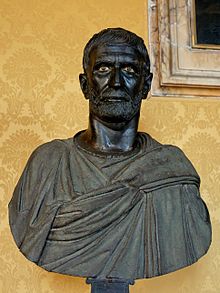
Brutus ended his speech by asking the assembly what form of government Rome should have. Though he himself was in line for the throne, he formally renounced all right to it. The people debated, and eventually decided to elect an Interrex, a ruler between kings, to act as a short-term regent. For the longer term they would have a pair of rulers called consuls who would be elected, and who would serve a limited term enacting the will of the Senate before being replaced by newly elected consuls. Lucretius was elected as Interrex, while Brutus and Colatinus were elected as the first consuls of Rome. Lastly the Tarquins were declared banished from Rome and all its territories in perpetuity.
Tullia was in Rome at the time, and she was a witness to Brutus’ speech. She fled the city before the assembly had finished its debate, and headed to Tarquin’s camp to warn him. He and his sons immediately headed to Rome, but by the time they arrived the revolution had been confirmed by a public vote and the gates were barred to them. Worse, messengers had passed them on the road and news of the revolution had reached the troops. They held a vote and decided to join the new Republic. At a stroke Tarquin was removed from power, and he and his family were forced to flee to sanctuary among Rome’s enemies.
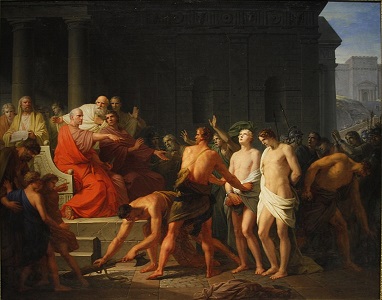
Sextus fled to Gabii, which proved to be a surprisingly bad choice. He was soon assassinated by relatives of those who he had betrayed there. Tarquin and his other two sons found sanctuary in his ancestral homeland of Etruria. He sent messengers to Rome, ostensibly accepting his exile and trying to recover his personal fortune from them in return. He was actually trying to draw the discontented in the city into a counter-revolution. When this was discovered, the men involved were all executed. The two sons of Brutus were implicated in the conspiracy, and he was forced to condemn them both to death.
With his plot frustrated, Tarquin gathered an Etrurian army to retake the throne by force. Brutus and Valerius led an army into the field to stop him. It was a hard-fought battle, but Tarquin’s forces were in the end defeated in the Battle of Silva Arsia (the Arsian Forest). His son Arruns was killed in the battle. The Romans also suffered casualties, the most notable being Lucius Junius Brutus. Valerius carried his body back to Rome, where he received a hero’s funeral.
In 498 BCE Tarquin made one final push to retake his throne. He had married his daughter to Octavius Mamilius, the leader of the city-state of Tusculum, in order to get his support in an invasion of Rome. By now the Romans had begun electing “dictators”, or military leaders with supreme but time-limited powers, in cases of emergency like this. The consuls acting as military leaders had been destabilising due to giving one more power than the other, so this resolved that issue. The dictator elected to defend Rome was Aulus Postumius Albus. Tarquin and his remaining son Titus took the field, which may have been a mistake as it inspired the Romans to fight more fiercely against the hated tyrant. In a pitched battle at Lake Regillus the Roman forces killed Octavius and drove the Tarquins from the field. They would never again return to face Rome in battle, and both Tarquin and his son died in exile. Rome would never again have a king.

If the story of Tarquin seems a little too neat and polished, that may not be a coincidence. The story of heroic rebels fighting against a murderous usurper may in fact all be a later invention of Roman historians summarizing a longer struggle against foreign rulers. In fact Rome itself may actually have been an Etruscan colony, with the Etruscan “kings” only being local provincial governors. This would go against the Roman myth of themselves as a city destined to rule. The truth is, though, that there may never even have been a Tarquin the Proud.
If there was no such person as Tarquin, though, he still cast a long shadow. The very idea of a king became anathema to the Roman people forever, and while the new Roman Republic had growing pains it would still endure for the next five hundred years. Perhaps the biggest sign of this was the actions of a man named after Lucius Junius Brutus who would take inspiration from the legend of his namesake and lead a group who struck down Julius Caesar when they thought he was going to make himself king. But despite this, Brutus and his conspirators only managed to delay the return of absolute rule to Rome by a few years. In 27 BCE Gaius Octavius took the title of Augustus and became the lifelong ruler of Rome. Even then, he trod carefully and did not take the title of “king”, though that was what he was in all but name. His successors would forge a new title to replace the hated word “king”, and called themselves Emperors. It was all a matter of semantics, though. The truth was that once again the people of Rome had ceded the responsibility that democracy gave them to an absolute ruler, someone they convinced themselves would be better able to handle the affairs of state than the people. History would show how wrong they were.
Pictures via wikimedia.
